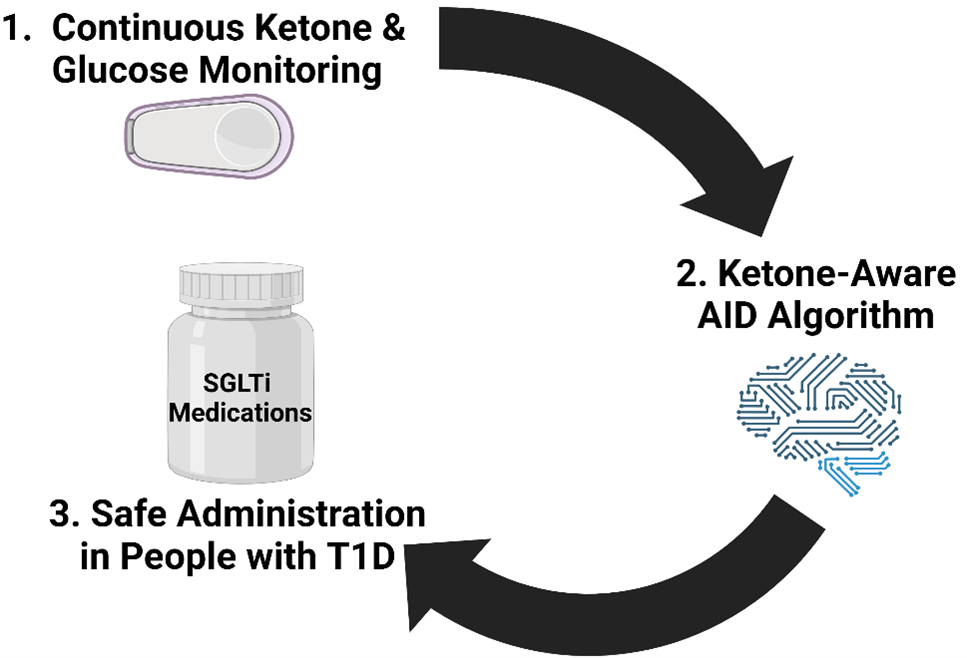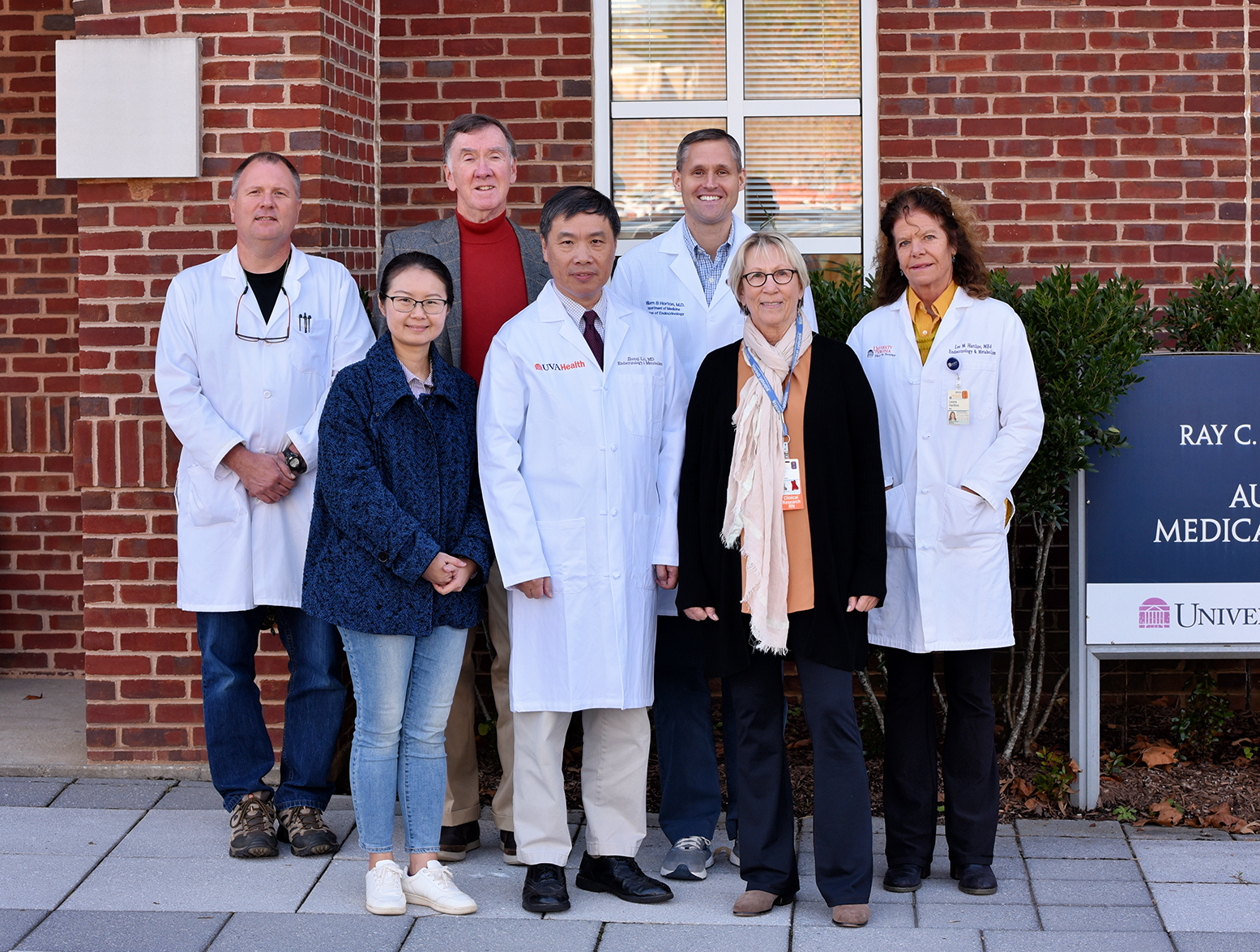William B. Horton, MD, MSc, FACP

PRIMARY APPOINTMENT:
Associate Professor of Medicine, Endocrinology, and Metabolism
CONTACT:
Email: WBH2N@virginia.edu
TRAINING:
- Undergraduate: B.S. (Biology Medical Sciences), Mississippi College; Clinton, MS
- Doctoral: M.D., University of Mississippi School of Medicine; Jackson, MS
- Graduate: M.Sc. (Clinical Research), University of Virginia; Charlottesville, VA
- Residency: Internal Medicine, University of Mississippi Medical Center; Jackson, MS
- Fellowship: Endocrinology, Diabetes, and Metabolism, University of Virginia; Charlottesville, VA
- Fellowship: Endocrinology, Diabetes, and Metabolism, University of Virginia; Charlottesville, VA
FUNDED PROJECTS:
- Breakthrough T1D (3-SRA-2023-1236-M-B)
- Breakthrough T1D (3-SRA-2025-1773-M-B)
RESEARCH INTERESTS:
Type 1 diabetes; Diabetes technology; Cardiovascular diabetology; Inpatient glycemic control
RESEARCH SUMMARY:

Figure 1. The impact of vascular insulin resistance on cardiovascular health in people with diabetes.
The DCCT/EDIC Study showed that appropriate glycemic control (defined as maintaining an HbA1c value <7%) reduced the risk of cardiovascular disease (CVD) by 42% and severe cardiovascular events (nonfatal myocardial infarction, stroke, or death from CVD) by 57% over 17 years in people with type 1 diabetes (T1D) (1). Unfortunately, only ~20% of American adults with T1D are achieving this HbA1c target (2) despite the availability of modern insulin analogs (3), the improving accuracy of glucose monitoring (4; 5), and the expanding use of closed-loop automated insulin delivery (AID) systems (6). While these new technologies have proven benefits in reducing diabetes-related complications (7), excess mortality rates remain higher in people with T1D compared to the general population (8), and cardiovascular mortality rates have remained relatively static over the last 20 years (9). Indeed, epidemiological data indicate that people with T1D have lifespans ~11-13 years shorter (10) and experience CVD events on average more than a decade earlier than the general population (11). Numerous studies have identified CVD as the leading cause of death in T1D (12-15) and worrisomely found that T1D confers substantial CVD risk even when conventional HbA1c treatment targets are achieved (16; 17).

Figure 2. Development of a “ketone-aware” AID algorithm to eliminate ketoacidosis risk and allow for safe administration of SGLTi medications in people with type 1 diabetes.
Our research aims to test therapies that can be combined with closed-loop AID to optimize glycemic control and provide pleiotropic effects that will further improve cardiovascular health and reduce incident cardiovascular disease in this population. With this, we have two active and one upcoming project(s). First, we are evaluating the cardiovascular impact of improving glycemic control (via closed-loop AID) in people with type 1 diabetes. This project is funded by Breakthrough T1D (SRA-2023-1236-M-B). An upcoming study (also funded by Breakthrough T1D; SRA-2025-1773-M-B) will test whether a novel insulin-sensitizing drug (CIR-0602k) that targets the mitochondrial pyruvate carrier can improve glycemic control and reduce total daily insulin dose when combined with closed-loop AID in people with type 1 diabetes (see Figure 1). Finally, we are collaborating with the UVA Center for Diabetes Technology to develop a “ketone-aware” closed-loop AID system that receives input from a combined continuous glucose and continuous ketone sensor (see Figure 2). The ultimate goal of this project is to develop a ketone-aware AID system that will allow for safe administration of sodium-glucose cotransporter inhibitor (SGLTi) medications in people with type 1 diabetes.

Left back row: Kevin Aylor, Eugene Barrett, William ‘Ben’ Horton, Front row: Jia Liu, Zhenqi Liu, Linda Jahn, Lee Hartline
Kara Anderson, Linda Jahn, Lee Hartline
- Nathan DM, Cleary PA, Backlund JY, Genuth SM, Lachin JM, Orchard TJ, Raskin P, Zinman B, Diabetes C, Complications Trial/Epidemiology of Diabetes I, Complications Study Research G: Intensive diabetes treatment and cardiovascular disease in patients with type 1 diabetes. N Engl J Med 2005;353:2643-2653
- American Diabetes A: 6. Glycemic Targets: Standards of Medical Care in Diabetes-2019. Diabetes Care 2019;42:S61-S70
- Hirsch IB: Insulin analogues. N Engl J Med 2005;352:174-183
- Klonoff DC, Prahalad P: Performance of Cleared Blood Glucose Monitors. J Diabetes Sci Technol 2015;9:895-910
- Castle JR, Jacobs PG: Nonadjunctive Use of Continuous Glucose Monitoring for Diabetes Treatment Decisions. J Diabetes Sci Technol 2016;10:1169-1173
- Kovatchev B, Tamborlane WV, Cefalu WT, Cobelli C: The Artificial Pancreas in 2016: A Digital Treatment Ecosystem for Diabetes. Diabetes Care 2016;39:1123-1126
- Kovatchev BP, Lobo B, Fabris C, Ganji M, El Fathi A, Breton MD, Kanapka L, Kollman C, Battelino T, Beck RW: The Virtual DCCT: Adding Continuous Glucose Monitoring to a Landmark Clinical Trial for Prediction of Microvascular Complications. Diabetes Technol Ther 2025;
- Lind M, Svensson AM, Kosiborod M, Gudbjornsdottir S, Pivodic A, Wedel H, Dahlqvist S, Clements M, Rosengren A: Glycemic control and excess mortality in type 1 diabetes. N Engl J Med 2014;371:1972-1982
- 59thEASD Annual Meeting of the European Association for the Study of Diabetes. Diabetologia 2023;66:1-536
- Livingstone SJ, Levin D, Looker HC, Lindsay RS, Wild SH, Joss N, Leese G, Leslie P, McCrimmon RJ, Metcalfe W, McKnight JA, Morris AD, Pearson DW, Petrie JR, Philip S, Sattar NA, Traynor JP, Colhoun HM, Scottish Diabetes Research Network epidemiology g, Scottish Renal R: Estimated life expectancy in a Scottish cohort with type 1 diabetes, 2008-2010. JAMA 2015;313:37-44
- de Ferranti SD, de Boer IH, Fonseca V, Fox CS, Golden SH, Lavie CJ, Magge SN, Marx N, McGuire DK, Orchard TJ, Zinman B, Eckel RH: Type 1 diabetes mellitus and cardiovascular disease: a scientific statement from the American Heart Association and American Diabetes Association. Diabetes Care 2014;37:2843-2863
- Morrish NJ, Wang SL, Stevens LK, Fuller JH, Keen H: Mortality and causes of death in the WHO Multinational Study of Vascular Disease in Diabetes. Diabetologia 2001;44 Suppl 2:S14-21
- Jorgensen ME, Almdal TP, Carstensen B: Time trends in mortality rates in type 1 diabetes from 2002 to 2011. Diabetologia 2013;56:2401-2404
- Secrest AM, Becker DJ, Kelsey SF, LaPorte RE, Orchard TJ: All-cause mortality trends in a large population-based cohort with long-standing childhood-onset type 1 diabetes: the Allegheny County type 1 diabetes registry. Diabetes Care 2010;33:2573-2579
- Secrest AM, Becker DJ, Kelsey SF, Laporte RE, Orchard TJ: Cause-specific mortality trends in a large population-based cohort with long-standing childhood-onset type 1 diabetes. Diabetes 2010;59:3216-3222
- Kanter JE, Shao B, Kramer F, Barnhart S, Shimizu-Albergine M, Vaisar T, Graham MJ, Crooke RM, Manuel CR, Haeusler RA, Mar D, Bomsztyk K, Hokanson JE, Kinney GL, Snell-Bergeon JK, Heinecke JW, Bornfeldt KE: Increased apolipoprotein C3 drives cardiovascular risk in type 1 diabetes. J Clin Invest 2019;129:4165-4179
- Saisho Y: Glycemic variability and oxidative stress: a link between diabetes and cardiovascular disease? Int J Mol Sci 2014;15:18381-18406
